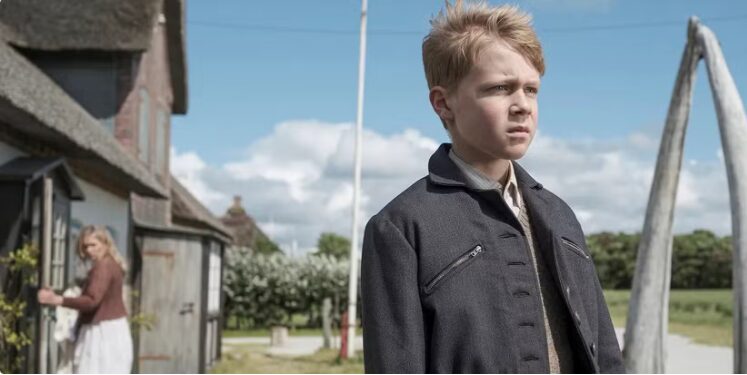
If you’re looking for a World War II movie full of explosions, dramatic speeches, and heroic last stands, Amrum is not that film. In fact, if you’re looking for any kind of drama with a clear emotional payoff, you might want to skip this one too.
Welcome to Amrum , the meditative, slow-burning coming-of-age story set on a quiet German island at the tail end of the war — where the biggest conflict isn’t necessarily between Allies and Nazis, but between two sisters arguing over politics while waiting for dinner.
🌊 Meet Nanning: The Boy Who Just Wants Butter
At the center of it all is Nanning (Jasper Billerbeck), a quiet, impressionable 12-year-old growing up on the isolated island of Amrum. He’s a member of the Hitler Youth, not because he’s particularly into fascism, but probably because it came with a cool uniform and maybe free snacks.
His mother, Hille (Laura Tonke), is as devoted to the Nazi cause as she is emotionally distant from her son. Meanwhile, his aunt Ena (Lisa Hagmeister) is… not exactly a rebel, but definitely less thrilled about the whole Third Reich thing. Their family dinners must’ve been awkward enough without the whole “global war” situation.
Nanning is caught in the middle — literally and metaphorically — trying to please his cold, authoritarian mom while quietly admiring his more open-minded aunt. It’s like being stuck between Mom and Aunt Karen during Thanksgiving, except everyone’s wearing swastikas.
🍞 The Most Dramatic Mission Since Moses Parted the Red Sea
Instead of grappling with the moral complexities of fascism or processing the collapse of the Nazi regime, Nanning focuses on what really matters: getting white bread, butter, and honey for his pregnant mother, who goes on a postpartum hunger strike.
Yes, that’s the emotional arc. While the war is ending, people are surrendering, and history is being rewritten, our protagonist is sprinting across beaches and fields trying to find basic groceries. If there’s ever a sequel called Nanning Goes to IKEA , I’m betting he’ll spend two hours just trying to find a meatball coupon.
🎨 Director Fatih Akin’s Masterpiece in Slow-Motion
Helmed by acclaimed director Fatih Akin , Amrum is a visual poem wrapped in fog and melancholy. There are long shots of windswept dunes, empty skies, and Jasper Billerbeck running slowly through tall grass. It’s beautiful — if you’re into that sort of thing. But if you’re expecting emotional payoff, character development, or even a single line of dialogue that doesn’t sound like it was whispered by a philosophy professor on mushrooms, prepare to be disappointed.
Akin seems more interested in mood than plot, and that’s fine — until you realize the film ends without really answering the questions it raises. Did Nanning change? Was he influenced by his rebellious aunt? Does he still believe in the Reich?
We don’t know. And honestly, neither does he.
👩🌾 Bonus Drama: Diane Kruger Is Here To Ruin Everything
Diane Kruger shows up briefly as Tessa , a local overseeing food production on the island. She’s already stressed about feeding everyone when a bunch of refugees arrive, prompting her to ask the uncomfortable question: “Is the war finally ending?”
Spoiler alert: Yes. But no one officially says it. Instead, they just take down their flags and start playing music. Which, sure, works as a celebration plan — but also leaves poor Nanning super confused.
He reports Tessa for questioning the party line, which gets him fired from his field job. And suddenly, we’re supposed to feel conflicted about whether he’s a product of his environment or just a kid who wants a sandwich.
Spoiler alert again: The movie never tells us.
🧘 Final Verdict: Beautiful, Boring, and Baffling
Amrum is visually stunning, emotionally restrained, and narratively sparse — like watching a black-and-white Ingmar Bergman film directed by someone who really loves seagulls and silence.
It’s a bold choice to make a WWII coming-of-age film that avoids grand historical moments and instead centers around a child’s quest for carbs. But unless you’re in the mood for cinematic ASMR, this one might leave you checking your watch more often than nodding along.
Still, if you enjoy films that ask deep questions without giving answers — like life itself — then Amrum might be your jam.







